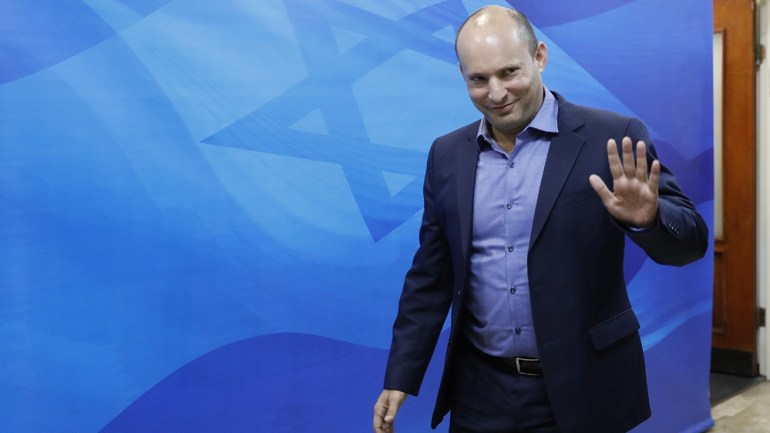Benjamin Netanyahu and his Likud party’s efforts to find defectors among opponents is the latest example of ‘King Bibi’ and his lust for power.
After the fourth election in two years and the ever-more-likely departure of Benjamin Netanyahu as the country’s prime minister, the situation in Israel is becoming increasingly volatile – and Netanyahu himself is once again pouring fuel on the fire.
Netanyahu faces nothing less than the loss of power on Sunday after 12 years in office, but he is not inclined to accept the latest development of a variety of opponents joining hands against him.
Instead, he is putting massive pressure on Knesset members so they do not vote for a new government by mobilising his supporters, who have been gathering in front of the houses of lawmakers for demonstrations and intimidation efforts.
These next few days will show whether the Netanyahu era is indeed over. Since the planned government alliance with Prime Minister-designate Naftali Bennett only has a slim majority of 61 of the 120 seats in parliament, every day counts.
Netanyahu and his Likud party’s efforts to find defectors among the coalition forces is the latest example of “King Bibi” and his quest for power.
Ironically, it was Netanyahu who made the next government possible by passing a new law and by ending the tradition of not entering talks with Arab parties, said Donna Robinson Divine, professor of Jewish Studies and Government at Smith College.
“Netanyahu paved the way for the alternate government about to gain power. He introduced a Basic Law allowing for alternative prime ministers; he began to speak to Mansour Abbas about supporting his own coalition,” she told Al Jazeera.
Machiavellian power plays
It has become a reoccurring theme in Israeli politics. For years Netanyahu utilised all kinds of political shenanigans and Machiavellian power plays to remain the country’s prime minister. However, Israel has paid for it dearly. Politically, Israel has been paralysed. Even the most basic government responsibilities have been put on hold, Divine said.
“Netanyahu found ways to impose four elections in two years on Israel, with the country having to operate without a budget for the last two,” she noted.
Socially, the country is deeply divided, essentially into pro and anti-Netanyahu camps.
The head of Israel’s domestic security agency Shin Bet, Nadav Argaman, warned of political violence and asked all those involved to disarm verbally.
Without naming names, Argaman’s remarks were directed primarily at Netanyahu and Likud. The latter has openly insulted right-wing Knesset members of the future coalition as traitors.
While Netanyahu himself said he condemned any call to violence, he is fully cognisant of his words and their effects.
“Netanyahu is an extremely bright, well-read politician and a master of Israeli political tactics,” said Divine.
His words were thus chosen deliberately. Netanyahu spoke of “the greatest electoral fraud in the state’s history“, and even the “greatest fraud in the history of democracy”. Bennett’s decision to enter a coalition with the left and Arabs was why people felt deceived and reacted accordingly, Netanyahu pontificated.
Netanyahu’s rhetoric resembles former US President Donald Trump and his post-election remarks, particularly on January 6 – lies that triggered rare political violence in that country.
 Naftali Bennett’s Yamina party has denied it would seek to pass a law barring Netanyahu from office [File: Abir Sultan via AP]
Naftali Bennett’s Yamina party has denied it would seek to pass a law barring Netanyahu from office [File: Abir Sultan via AP]‘Israel is at risk’ campaign
Asked about whether Netanyahu’s remarks of election fraud are similar to Trump’s playbook, Uriel Abulof, visiting associate professor at Cornell University, told Al Jazeera: “To an extent: Netanyahu was not suggesting that it was rigged, but that Bennett deceived his voters. However, Bennett did not, as he clearly indicated that he would like to see Netanyahu removed.”
Indeed, Bennett declared he did not want to work with main coalition partner Yair Lapid or Arab parties. However, the devil appears to be in the detail, said Abulof.
“Many refer to Bennett’s signing a document pledging not to sit with Lapid and the Arab party, but forget that the document bore the title of ‘treaty’, and Bennett invited Netanyahu to sign it. Netanyahu did not, so supposedly it is void.”
However, as Abulof also pointed out, Bennett did not resort to this rationale. Hence, he might feel he did indeed rescind his pledge.
Additional fuel was added by the support from an influential group of national-religious and ultra-Orthodox rabbis, who adopted a similar tone by stating “everything” needed to be done to prevent the new government from being sworn in.
Moreover, the situation has been exacerbated further by reports the new government would seek to pass a law that would bar Netanyahu from office.
While Bennett’s Yamina party is claiming this was just a proposal and denying this law made it to the final version of the agreement among the coalition, the rumour itself has had an effect already and might be to Netanyahu’s benefit, said Maayan Geva, lecturer in the Department of Social Science at the University of Roehampton.
“The reports have been spread very extensively by Netanyahu himself and media outlets which support him, so they are being used as part of Netanyahu’s ‘Israel is at risk’ campaign,” Geva told Al Jazeera.
While Geva acknowledged such a law could ultimately be passed, it is not without hurdles.
“Netanyahu is surely the source of many problems for competing politicians, and if they are in a position to pass a law to help them solve the Netanyahu problem, then they might very well pursue it. It is worth noting that even if a law is written and approved by the Knesset, it is very likely to be challenged at the High Court of Justice.”
‘Israel is not a monarchy’
Meanwhile, Bennett spoke of a “violent machine” that was deliberately set in motion. Then, addressing Netanyahu directly, he said, “Let go and allow Israel to move forward.”
Regarding Likud’s claims the new government would be far left, he replied the coalition was “10 degrees further to the right” than the current one and Israel was allowed to elect a government not headed by Netanyahu.
For Bennett, it will be about resilience and focus over these next days.
“There will be lots of shouting about the transition of government, but Naftali Bennett is correct – Israel is not a monarchy,” said Divine.
However, the damage has been done. Netanyahu is seemingly inclined to jeopardise Israel’s democracy for the slim chance to somehow remain in power, primarily for personal reasons, Divine said.
“His determination to remain in office as a way of avoiding prison if he is convicted on the charges against him have compromised state institutions.”
Nevertheless, the implications of Netanyahu’s selfish modus operandi are vast and dangerous, according to Geva.
“We are witnessing a desperate politician who has been in power for a long time and is fearful of what will happen if he is no longer PM. Netanyahu has a strong support base, and it is possible that some violence will ensue in response to his claims. Possibly some of this violence will be directed at members of the predicted government, in particular members of right-winged parties whom Netanyahu is portraying as traitors.”
Netanyahu, of all people, ought to be cognisant of how swiftly heated circumstances can escalate. In 1995, then-Prime Minister Yitzhak Rabin was murdered by a right-wing hardliner.
Similar to today, Netanyahu played a role and does not seem to have learned. While opposition leader, he was the key speaker at two demonstrations that included chants such as “Death to Rabin” and generally was involved in the anti-Rabin movement. He has denied the accusations.
“Netanyahu is again playing a major role in fuelling the dangerous idea that the country is under existential threat in an attempt to rally his supporters,” said Geva.
“Therefore, it is easy to compare the present with 1995 based on the concern that people will act on the accusations coming from Netanyahu and his supporters, and use violence in order to ‘save the country’.”
So what does the worst-case scenario look like? “A civil war if violence erupts,” said Abulof. However, the chances of that are currently minimal, he acknowledged.
“If Bennett is sworn in, chances are the state will compel Netanyahu to step down – however ungracefully,” he said.
In essence, the current situation is another test if Israel is becoming a failing state, Abulof concluded.
 Gistfox Your News Window To The World
Gistfox Your News Window To The World 




